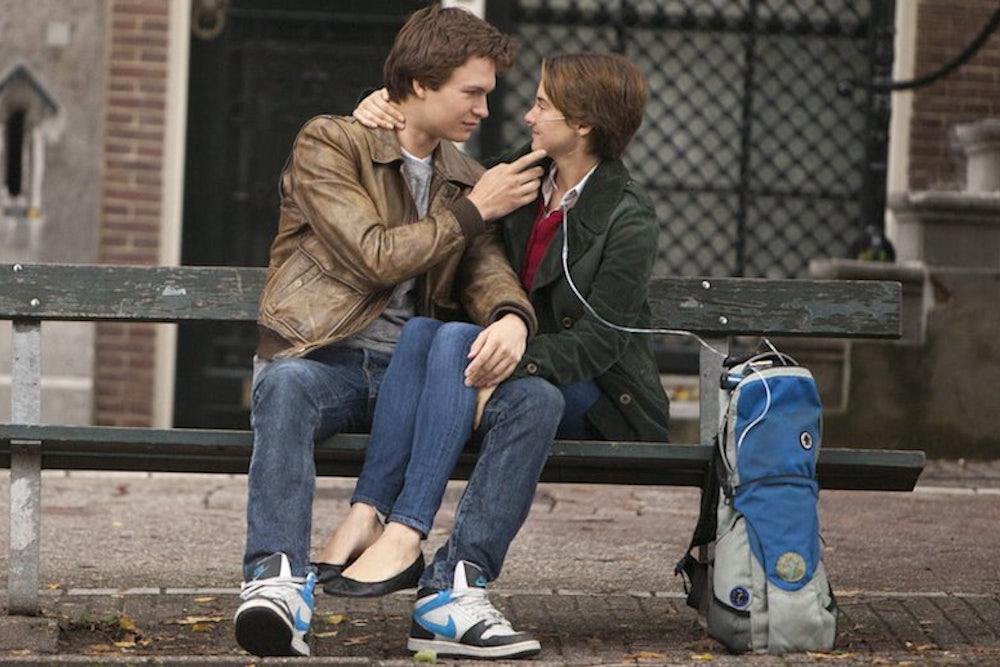One evening when I was 11 years old, lifelong friends of my parents came to our house for dinner. As the youngest child, I was the only one left at home to sulk on our living room floor and listen to adult chatter that I neither understood nor cared about. But the couple, Bob and Nancy, were thoughtful enough (and had witnessed my boredom enough) to bring me something to keep me occupied: a book, Betty Smith’s A Tree Grows in Brooklyn.
I won’t gush too long and too hard about how that novel affected me, how I felt Francie Nolan’s injustices, how romantic I found her fire escape reading perch, how I reveled in the fact that Francie was a reader like me. It’s enough to say that I loved—in fact, love—that novel. I reread it about once a year.
In the intervening years, I’ve only found about a half dozen “young adult” books that I’ve enjoyed and found fulfilling. I will reread the Harry Potter books over and over until the day I die. I haven’t come close to picking up The Fault in Our Stars. I found The Hunger Games books clumsy and absurd. Don’t get me going on The Perks of Being a Wallflower. I rarely, if ever, seek out YA lit. It just (usually) isn’t my thing. But that doesn’t mean that the Ruth Graham piece Slate published Thursday, titled “Against YA: Read whatever you want. But you should feel embarrassed when what you’re reading was written for children,” has any merit whatsoever. In fact, Graham fundamentally misunderstands and mislabels the entire genre, and sends a ridiculous message that any reader should rebel against: “Adults should feel embarrassed about reading literature written for children” (itals hers).
You should never be embarrassed by any book you enjoy. And you certainly shouldn’t let some woman you’ve never met make you feel inferior for reading beneath your grade level.
The essay is riddled with a series of sweeping errors. Graham claims that unlike adult books, YA books have “satisfying” endings, which made me wonder if she’s ever heard of Jane Austen. She leaves out any book that isn’t “realistic”—as if such simple demarcations exist. She small-mindedly claims that readers only turn to YA for “escapism, instant gratification, and nostalgia.” She assumes that reading time is so desperately limited that it is the reader’s responsibility to devote themselves to “great” books: “These are the books that could plausibly be said to be replacing literary fiction in the lives of their adult readers,” she writes of YA. “And that’s a shame.”
But the article’s biggest problem—aside from its snide, nasty, belittling tone and self-satisfied, obviously click-baity headline—is Graham’s exceedingly limited understanding of why someone reads, and why they might choose to read a book that doesn’t challenge them on an academic level. For Graham, we’re all pliable little minds apt to be swept up in a publishing craze, unable to move beyond our most basic instincts for comfort, and coziness, and a nice good cry. Graham confuses literary criticism and review and dissection for smug scolding. She doesn’t unpack why adults would want to revisit their childhood via literature. It’s easier to be snide than smart, I suppose.
So why do I, despite generally sticking to the literary fiction section, reread a book about a teenager and written for teenagers year after year? Well, I suppose nostalgia is a part of it—each time I turn past the title page of A Tree Grows in Brooklyn I reimagine myself on the floor beneath the window of my childhood bedroom. But it’s also because to reread Francie’s story is to reread the story of my literary life. It’s a chance to be more kind and generous to my younger self, to remind myself of how deeply the decisions of my childhood have ingrained themselves on my soon-to-be-thirty brain. It’s a chance to remember that the complexities of adulthood are just variations on those from childhood.
